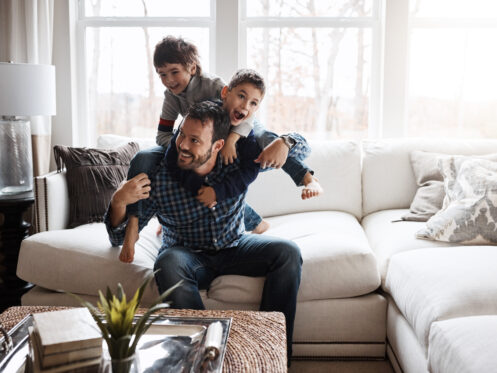Allergy control begins at home and specifically through achieving better indoor air quality (IAQ). The average person spends 90% of their time indoors. If you can reduce allergens in the home, you’re going to feel much better inside it but outside it too.
Ventilation
The first step is ensuring you have the right amount of ventilation. Too much uncontrolled natural ventilation makes it harder to keep pollen and other allergens out of the home. Too little ventilation is a problem as well, as it lends itself to high concentrations of allergens. You may need to reseal an older home. In homes with a tight seal and only passive attic ventilation, you may need to install a whole-house fan. You should also consider using window and door screens designed to block allergens.
HVAC Tune-Up
It’s also important to control allergens originating in the home. The Environmental Protection Agency (EPA) advises dusting your home at least once a week. Avoid overwatering houseplants. Schedule a seasonal HVAC tune-up. During that appointment, your technician will clean your HVAC equipment. The National Duct Cleaners Association (NADCA) recommends scheduling a duct inspection once a year. A seasonal tune-up is a great time to do that as well. Both the EPA and NADCA recommend professional duct cleaning as needed.
HVAC Filter
A tune-up is also an opportunity to discuss your HVAC filter with your technician. HVAC filters have a minimum efficiency reporting value (MERV) rating. The higher the rating, the better the filtration but the worse the airflow. Find out how high a MERV your system supports and upgrade your filter as needed.
Media Air Cleaner
You may also want to consider a media air cleaner. In the HVAC world, this term generally refers to air purifiers installed on the supply side of the HVAC system. That means that airflow is a concern. Any mechanical filtration will generally be between MERV 8 and 13. That’s good enough for large particulate matter, which includes most allergens. Often, these air cleaners will have an activated carbon stage. That media absorbs bad odors but also:
- Gases
- Fumes
- Smoke
- Chemicals
- Volatile organic compounds
HEPA Air Cleaner
If you want to eliminate practically all allergens, consider a high-efficiency particular air (HEPA) filter. HEPA eliminates 99.97% of all particulates down to 0.3 microns in size. It also traps a significant portion of the fine particulate matter in a home. Airflow restriction is a concern, so it’s typically installed on the return side of your HVAC system. Air changers per hour (ACH) is a consideration as well. This is the number of times a system can turn over all the air in a home. The Centers for Disease Control (CDC) recommends 4 ACH at a minimum. Many allergists advise somewhere between 6 and 8 ACH.
Electronic Air Cleaner
An electronic air cleaner is an alternative to HEPA. They’re not quite as effective as HEPA but are still rather effective at about 80%. They also don’t restrict airflow, which means that you can install them on the supply side.
Ultraviolet Treatment Systems
You can also opt for UV lamps in your ducts. These are generally used to reduce the presence of bacteria and viruses in a home. That said, they’re also a good choice for people with sensitive mold and mildew allergies.
Dehumidifier
Controlling humidity in a home is an oft-overlooked aspect of IAQ for people with allergies. The EPA recommends a relative humidity (RH) between 30% and 50%. The sweet spot for you is a matter of preference. Anything at 50% or below will be better for your warm weather allergies. That RH will all but eliminate the potential for mold and dust mites in a home. If you can’t achieve 50% through air conditioning alone, a whole-house dehumidifier will do it for you.
Humidifier
RH is important in winter too. The air is drier in winter. That inflames your respiratory system, which makes you more prone to cold weather allergies and heightens your symptoms. A whole-house humidifier will help you maintain an RH of 30% or above during the colder months.
Your Local IAQ Pros in Cape Coral
Ultimate Homes Cooling and Electrical is proud to help homeowners in Cape Coral and throughout the surrounding areas improve their IAQ. We install and service ventilation fans, air purifiers, dehumidifiers and humidifiers. Our HVAC technicians specialize in all manner of ducted and ductless heating and cooling systems. We also have electricians that perform electrical repairs, upgrade electrical panels and wire and rewire homes. Call today or contact us online with any questions or to schedule a consultation or service appointment.


